Ocimum basilicum
Basil

Description
Ocimum basilicum, commonly called basil, is a native of Africa and Asia. Tradition has it that basil was found growing around Christ's tomb after the Resurrection, and consequently, some Greek Orthodox churches use it to prepare holy water and pots of basil are set below church altars. In India, basil was believed to be imbued with a divine essence, and oaths were sworn upon it in courts. A number of varieties exist today, ranging from a tiny-leafed Greek basil to robust 2-foot-high plants with large succulent leaves. Some varieties have deep purple leaves. While flowers are typically small and whitish, some can be pink to brilliant magenta. Leaves can be dried for later use. Basil is extremely frost sensitive.
Plant Type
Annual, Herb
Height Range
Under 1'
Flower Color
Red
Flower Season
Spring
Leaf Color
Green
Bark Color
n/a
Fruit Color
n/a
Fruit Season
n/a
Sun
Full
Water
Medium
Growth Rate
Fast
Soil Type
Loam
Soil Condition
Rich, Well-drained
Soil pH
Acid
Adverse Factors
n/a
Design Styles
English Cottage, Formal
Accenting Features
Unusual Foliage
Seasonal Interest
Spring
Location Uses
Perennial Border
Special Uses
Container
Attracts Wildlife
n/a
Water Saving Tip:
Change spray sprinklers to low-flow bubbler or drip systems. Shrubs and trees are ideal candidates for this type of irrigation because the water is applied directly to the root zones.

